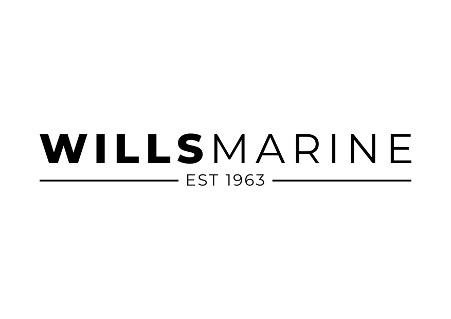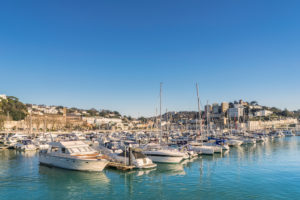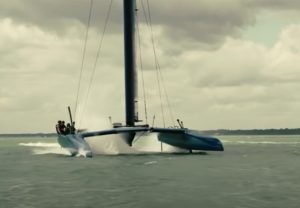Asia – positive outcomes for superyachts post-pandemic?

In the second of this four-part series, having discussed the reasons to be optimistic about the superyacht industry in Asia, MaryAnne Edwards from Global Marine Business Advisors turns her gaze to cruising in this region – and the positive changes to be found in the aftermath of the current pandemic.
It’s no secret that the Asia-Pacific region has handled the Covid-19 pandemic well. Being quick to close borders, placing their populations in lockdown, and putting stringent health and safety measures in place have all been effective – and lifesaving.
With New Zealand close to beating the pandemic and Australia not far behind, plus the very strong focus several ASEAN (Association of Southeast Asian Nations) countries have had on protecting their shores, cruising in this region will certainly be desirable for many high-net-worth individuals (HNWIs).
Australia is already seeing an influx of yachts and many are coming via Asia. While there are still considerable travel restrictions in place to prevent leisure cruising and owners flying in to join their yacht, owners are already planning their cruising itineraries. The region itself is putting strict regimes in place to ensure the health, safety and security of a new wave of HNW tourists.
The strategy of quality not quantity plus a focus on high-spend, low-impact tourism plays into the hands of the superyacht industry, which is destined to be seen as a much sought-after tourism sector by the region’s tourism bodies and governments.
Changing tide
Jaclyn Sienna India is the founder and CEO of Sienna Charles, a USA-based travel agency that specialises in servicing wealthy clients. In a recent interview with Wealthx where she discussed luxury travel, India states: “Weary of staying close to home, high-net-worth individuals are ready to set out for farther-flung destinations.
“Many ultra- and high-net-worth families relocated to their second homes to wait out their pandemic lockdown periods. They’ve spent a lot of time in homes they typically live in for the summer, so when the times come to travel, they’ll opt for international destinations instead. These clients will opt for yachts, private aviation and villas.
“Everyone is going to be a germaphobe for a really long time. We’re already seeing clients that will want to spend more money than usual for yachts, villas and private planes in order to be able to go on a trip that also safeguards their family. That’s going to be a major shift.”
Trips to cities like Paris will be replaced by journeys to less-populated locales. As for a trend specific to ultra-high-net-worth individuals, the more remote the vacation destination, the better.
This view was reiterated by Zara Tremlett, researcher and author of the Superyacht Services Guide. Based in Phuket, she says: “You may find the fact that certain countries in Asia have controlled Covid-19 so well is attractive to those wanting – and able – to travel later in the year; they are looking for remote destinations, less crowds, more exclusivity.”
While cruising is still to be discovered by Asian owners – the recent trend has been to use the yachts almost as family retreats or for business entertainment rather than cruising and exploring new areas – this is slowly changing.
Necessary steps
Because Indonesia is addressing infrastructure, be it in small steps, it’s a key future cruising destination in Asia. This focus on infrastructure is supported by the fact that there are experienced agents in the area, which is vital considering the bureaucracy that needs to be addressed and the distances covered in the country’s waters.
Indonesia also lies between the major hubs of Singapore/Thailand and Australia, making it attractive for captains who need to plan everything from victuals to onboard maintenance.
That said, Zara Tremlett cautions: “While ASEAN countries remain very strong as a business community, cultural differences and a fundamental lack of trust currently hinders borders becoming more open to cruising.
“Even if new regulations are created, they are – on a day-to-day level – managed by the officials on the ground who, due to the vast areas covered, may not even know about or understand a new regulation.”
She does, however, believe that a health certificate system for ships could come into place: “This could be an opportunity for ASEAN countries to step in and create a system acceptable to the area as a whole while the UK Maritime Coastguard Agency updates their own rules.”
Andy Shorten, owner of Light House Consultancy, has been operating in Indonesia for many years. He agrees with Zara and says: “The more people understand and share the experience, the less surprises and the better experience guests will have.
“There are certainly more marinas being developed in Indonesia and existing facilities are evolving, which will lead to new interest and hopefully local communities benefiting from the yachting culture in this part of the world.”
YH Fang, founder of Yachting Singapore, believes Chinese/Hong Kong owners are still by far the biggest group in Asia, and he is not alone. He says: “If yachts are kept in Asia, Hong Kong would be the normal choice to berth.
“These yachts, if they move, would normally go to Palau, the Philippines or Borneo. Malaysian owners will keep their yachts in Phuket or Langkawi; they do cruise to the South China Sea following the season. Borneo would be their natural choice, but some have ventured further.
“Indonesian/Singapore owners are the smallest group and would do the Indian Ocean or South China Sea depending on the season. I am interested in Indonesia because the potential and positive impact on the industry is far greater. Many places are inaccessible unless you have a superyacht, and this is important to many owners.”
Many in Phuket are saying the ocean is resting as a result of the lack of mass tourism activity and a positive rejuvenation of local marine life is occurring. It finally appears the Tourism Authority of Thailand is starting to understand the issues mass tourism brings – something their new tourism strategy is addressing, which is welcomed by the local industry.
Looking forward
Everyone in the Asian region has been in lockdown in one way or another and are keen to start preparing for life after Covid-19. Yachts are still in the region and feedback from captains confirms the industry has looked after their yachts and crew amazingly well during this crisis.
Many yachts have had their plans disrupted, taking the opportunity to undertake regular maintenance. A number are already in or headed to Australia for more in-depth refits and repairs. Australia has kept the borders open for yachts booked in for work and has provided welcoming regulations for crew, which has resulted in the Australian refit yards being as busy as ever.
Given the inability of Australian owners to travel overseas, it is also expected there will be an increase in domestic chartering and private cruising within Australia. Once borders open in Asia and restrictions are lifted, the boats will come.
Owners will have a new mindset and the industry must have the protocols and the health and safety measures well and truly in place to provide the peace of mind and confidence that owners will require for their family and crew’s wellbeing.
If this can be achieved, there is no reason why cruising shouldn’t start to benefit from the worldwide changes of Covid-19.
Check in tomorrow to read more from MaryAnne Edwards from GMBA about the role of boat shows.
Global Marine Business Advisors (GMBA), where this article was previously published, is a worldwide advisory service for the leisure marine industry. It says its new website is a one stop shop for businesses looking for advice within the marine sector, and provides a clear understanding of the geographical scope, the industry sectors and broad range of services that can be accessed from GMBA consultants.











